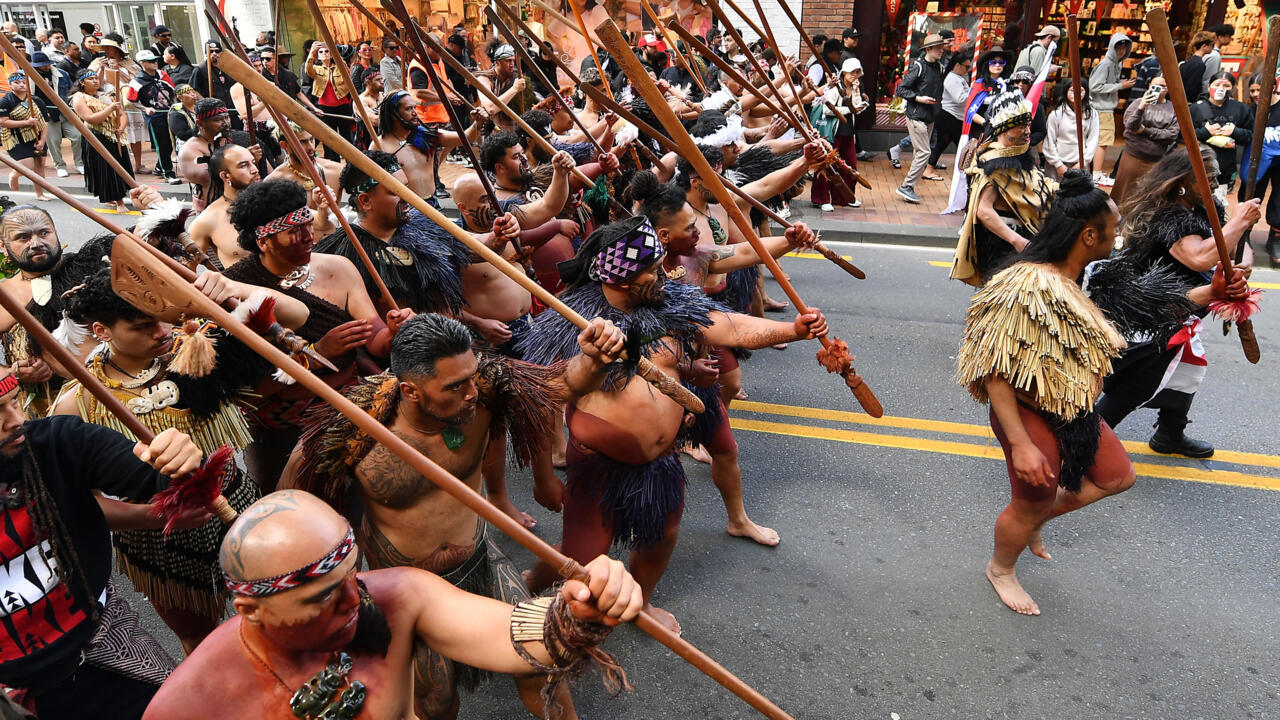More than 35,000 demonstrators poured into the harbourside city of Wellington, police said, shutting down busy streets as their spirited procession inched its way towards parliament. […] Children marched alongside adults bearing distinctive full-face Maori “moko” tattoos and clutching ceremonial wooden weapons.
Protests have been swelling throughout New Zealand after a minor party in the conservative coalition government drafted a bill to redefine the 1840 Treaty of Waitangi. Although the bill has almost no chance of passing, its mere introduction has triggered one of New Zealand’s largest protests in decades. Many critics – including some of New Zealand’s most respected lawyers – see it as an attempt to strip long-agreed rights from the country’s 900,000 strong Maori population.
At the centre of the outcry is government minister David Seymour, the outspoken leader of the libertarian ACT Party – a minor partner in the governing coalition. Seymour has long railed against affirmative action policies designed to help Maori, who remain far more likely to die early, live in poverty, or wind up in prison. His bill would look to wind back these so-called “special rights”.
Seen as the country’s founding document, the Treaty of Waitangi was signed in 1840 to bring peace between 540 Maori chiefs and colonising British forces. Its principles today underpin efforts to foster partnership between Indigenous and non-Indigenous New Zealanders and protect the interests of the Maori community.
The Haka in the parliament was awesome.
Damn, 35,000 in full regalia would be a sight to see. I hate the reason, but would love to see it.
I attended this hīkoi (march). Only the people at the front were in traditional dress. Most other people were wearing clothes that they painted the Māori flag onto, or just in normal clothes. Was still very very cool to see, though
Why do they get special rights? Shouldn’t every citizen be entitled to healthcare, welfare and social support?
Everyone does have those rights.
Basically, back in the day, when the Europeans arrived in New Zealand and wanted to set up shop, they signed a treaty with the Māori that the Europeans would govern the Europeans and the Māori would govern the Māori. This is called co-governance. At this time, Māori vastly outnumbered the colonists.
The Europeans promptly ignored the treaty and became so large in numbers that they formed the government. There is a Māori section of government that is focused on Māori issues. This bill would essentially get rid of that and let the European-formed government decide what is best for Māori.
It’s a slap in the face to say “hey, you can govern yourselves. Oh wait now we outnumber you, you shouldn’t be allowed to speak your language and also you have to follow our laws. Oh also you’re not allowed to govern your own people anymore, you have to follow our colonial way of doing things. K thx”
The “special rights” that David Seymour is talking about is basically anything specifically laid out to help Māori, so a form of affirmative action. I understand the initial distaste towards race-based solutions to problems, but it’s the only way to fix problems that were caused by race-based policies in the first place. Colour-blind equality won’t fix issues caused by systemic racism.
This is my current understanding at least. I’m a Kiwi and I attended this hīkoi (march).
Makes sense historically, but once the Europeans have children with the Maori, which government are the children (and their children, etc) supposed to fall under?
Good question. Anyone who is part or all Māori can choose whether they vote for the Māori electorate or the general electorate. As for services, I don’t know. If I had to guess, you’d have to be a member of an iwi (tribe) or at least be part Māori. But there are services for everyone; it’d be Māori-based services that would be aimed at Māori. They have different cultural values and methods, so it’s more the way the services are provided rather than the services themselves.
For example, during the COVID-19 vaccine rollout, there was some discussion about Māori wanting to have their whole whānau (family) vaccinated at the same time because it’s seen as a collective measure and followed cultural Māori family values. At the time, they were being rolled by age, so some people in a family could get it while others couldn’t. There are valid discussions to be had for both methods.
TL;DR - if someone has Māori ancestry, they can choose which electorate to vote in and which services to receive
Right, it’s not hard to imagine it being divisive and controversial with some people being able to choose and switch between which laws they’re governed by
Everyone does get those.
The beef is… Complicated. Read the post body.
They are entitled already lol. It’s about equity, balancing the care.




